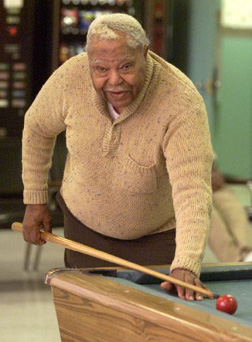VOICES OF HISTORY
Vets become civilians
Story by John Keilman,
photos by Lisa Powell
Series - Second of Five Parts
Published: Monday, February 15, 1999 ; Edition: CITY ; Section: NEWS ; Page: 1A .
 As Adolph Hitler's forces raced across Europe in the late 1930s, the United
States, again reluctant to engage itself in world affairs, simply watched. Its
neglect ended violently on Dec. 7, 1941, when Japanese planes attacked Pearl
Harbor.
As Adolph Hitler's forces raced across Europe in the late 1930s, the United
States, again reluctant to engage itself in world affairs, simply watched. Its
neglect ended violently on Dec. 7, 1941, when Japanese planes attacked Pearl
Harbor.The sleeping giant awoke, and used all of its industrial might to build ships, planes, tanks and guns. It ushered 15 million citizens into its armed forces, 1 million of them black. And it began to toss aside rules that hindered the war effort.
 Ned
Wood, playing pool at his apartment complex on Grand Avenue, returned from
World War II only to be offered the same menial job he had left. Ned
Wood, playing pool at his apartment complex on Grand Avenue, returned from
World War II only to be offered the same menial job he had left.
|
Black forces fought well. The Tuskegee Airmen, a group of black pilots, became one of America's most feared aerial forces. Ned Wood helped supply the troops in Europe, and like many of his comrades, he found unheard-of freedoms in this new world.
On the home front, Ellen Lee Jackson continued working in Dayton while two of her brothers served. Yvonne Walker-Taylor, who had married a Tuskegee Airman, moved to a military base in Alabama.
Cooper never made it to combat. During officer training he slipped on a bar of soap someone had left on a 30-foot-high diving platform and tumbled into the swimming pool below, injuring his back. Just before he was to leave for the Pacific, a medical exam disqualified him from the service. He then went to work at his alma mater, Hampton Institute. At the war's end, many blacks returned home to find their sense of freedom snuffed. Ned Wood was offered the same menial job he had left. But the war had left money in black people's pockets and a new hunger for equality in their hearts. There would be no going back.